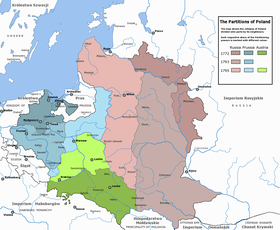Partitions of the Polish–Lithuanian Commonwealth
| Partitions of Polish-Lithuanian Commonwealth | |
|---|---|

The Polish–Lithuanian Commonwealth in 1772
|
|
| Elimination | |

The three partitions of Poland (the Polish–Lithuanian Commonwealth). The Russian Partition (Red), the Austrian Partition (green), and the Prussian Partition (blue)
|
The Partitions of Poland were three partitions of the Polish–Lithuanian Commonwealth that took place towards the end of the 18th century and ended the existence of the state, resulting in the elimination of the sovereign Poland for 123 years. The partitions were conducted by the Russian Empire, the Kingdom of Prussia and Habsburg Austria, which divided up the Commonwealth lands among themselves progressively in the process of territorial seizures.
The First Partition of Poland was decided on August 5, 1772. Two decades later, Russian and Prussian troops entered the Commonwealth again and the Second Partition was signed on January 23, 1793. Austria did not participate in the Second Partition. The Third Partition of Poland took place on October 24, 1795, in reaction to the unsuccessful Polish Kościuszko Uprising the previous year. With this partition, the Commonwealth ceased to exist.
In English, the term "Partitions of Poland" is sometimes used geographically as toponymy, to mean the three parts that the partitioning powers divided the Commonwealth into the Austrian Partition, the Prussian Partition and the Russian Partition. In Polish, there are two separate words for the two meanings. The consecutive acts of dividing and annexation of Poland are referred to as rozbiór (plural: rozbiory), while the term zabór (pl. zabory) means each part of the Commonwealth annexed in 1772–95 becoming part of Imperial Russia, Prussia, or Austria.
In Polish historiography, the term "Fourth Partition of Poland" has also been used, in reference to any subsequent annexation of Polish lands by foreign invaders. Depending on source and historical period, this could mean the events of 1815, or 1832 and 1846, or 1939 (see below), bringing the total number of Poland's names for the ceding of territory to neighboring empires to seven. The term "Fourth Partition" in a temporal sense can also mean the diaspora communities that played important political role in re-establishing the Polish sovereign state after 1918.
...
Wikipedia
